 Petzlover
Petzlover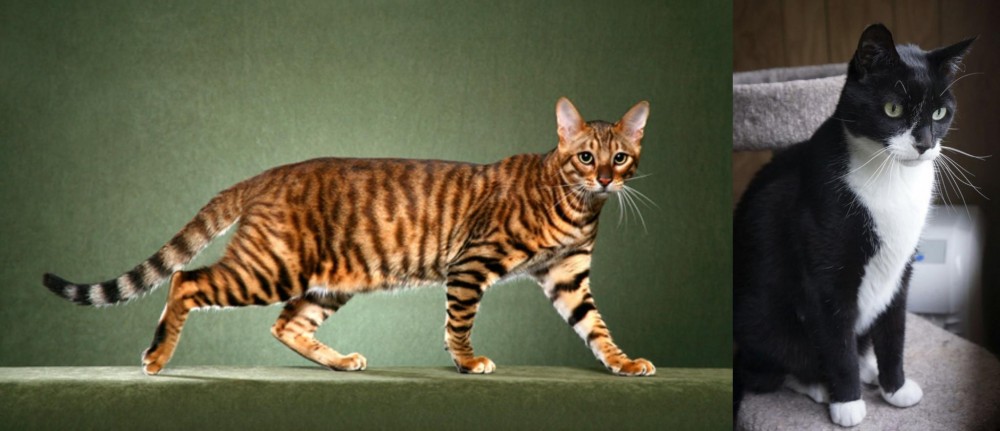 Both Toyger and Tuxedo are originated from United States. Both Toyger and Tuxedo are of same weight. Toyger may live 5 years less than Tuxedo. Both Toyger and Tuxedo has same litter size. Both Toyger and Tuxedo requires Moderate Maintenance.
Both Toyger and Tuxedo are originated from United States. Both Toyger and Tuxedo are of same weight. Toyger may live 5 years less than Tuxedo. Both Toyger and Tuxedo has same litter size. Both Toyger and Tuxedo requires Moderate Maintenance.
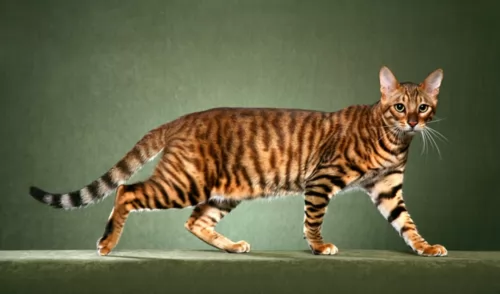 The Toyger is a domestic cat developed from breeding Shorthaired Tabbies to look like a small Tiger.
The Toyger is a domestic cat developed from breeding Shorthaired Tabbies to look like a small Tiger.
It has the striped coat of the Tiger. The person to develop the Toyger is Judy Sugden.
The unusual-looking cat has been recognized for registration by the International Cat Association in the 1990s. It was accepted as a full championship breed in 2007.
Today this designer cat is recognized by the ICA but not the Cat Fancier's Association.
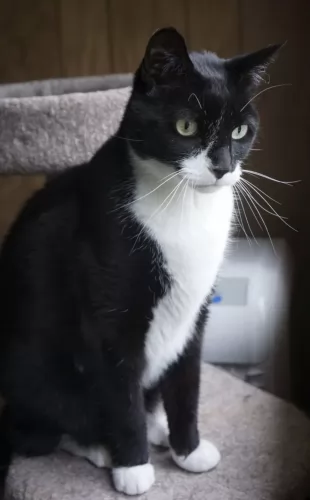 The Tuxedo cat is essentially a black and white cat and the name comes from him looking like he is dressed in a formal tuxedo.
The Tuxedo cat is essentially a black and white cat and the name comes from him looking like he is dressed in a formal tuxedo.
Tuxedos aren’t a new cat breed and they have been around for thousands of years. Tuxedo is merely describing the coat of the cat. So the Tuxedo cat isn’t a cat breed but rather a pattern color. A Persian cat as an example, can be a tuxedo cat because of its coat.
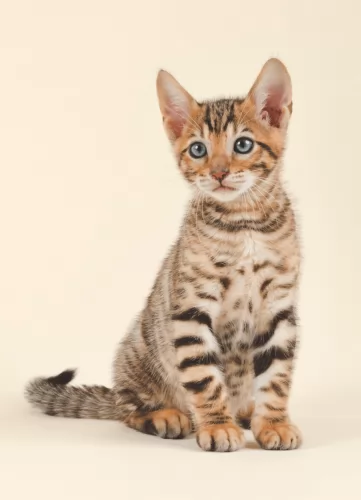 The Toyger is a medium to large-sized cat that can weigh between 5 and 9kg. As with any cat, with these newer kinds of cats, the size of the cat can vary.
The Toyger is a medium to large-sized cat that can weigh between 5 and 9kg. As with any cat, with these newer kinds of cats, the size of the cat can vary.
It is a shorthair cat that is quite a bit bigger than your regular cat. The coat of this mixed breed cat has markings similar to that of a tiger - vertical orange striping with rosettes.
The coat of the cat is short and he is a brown mackerel tabby with stripes being a dark brown to black. The eyes of the cat can be a blue, aquamarine, green, or gold.
These cats have a laid back disposition, and will comfortably slot into a busy household.
They are playful and intelligent and can be taught tricks and to walk on the lead.
This cat enjoys the company of people and will get on well with other pets too. People who have owned them say they are the most affectionate and loving cats there are and will enjoy being petted and pampered by their human family.
They get on well in busy households where there are children and other pets. They’re super smart and can be trained with ease.
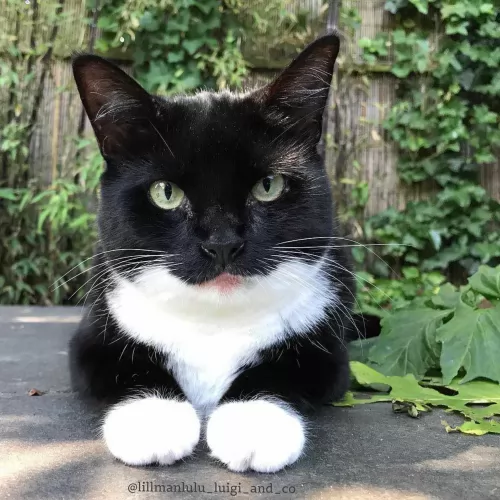 A tuxedo cat has distinct coat colors. Their bicolor coats are soft and sleek and sometimes the colors aren't limited to just black and white but they can be orange, gray or tortoiseshell.
A tuxedo cat has distinct coat colors. Their bicolor coats are soft and sleek and sometimes the colors aren't limited to just black and white but they can be orange, gray or tortoiseshell.
Because Tuxedo cats aren’t a breed, nothing is really set in stone with them and their size ranges. This means he can weigh between 3 and 7kg or 8 or even 9kg. The eyes of the Tuxedo cat are nearly always green.
The Tuxedo cat’s personality is varied as well because it can be any breed of cat. There are some Tuxedo cat owners who will say that their cats have a definite Tuxedo personality, but there is no research that indicates that these cats have a particular personality.
They are all different. Most Tuxedo cats however are friendly, social, loving, and lively.
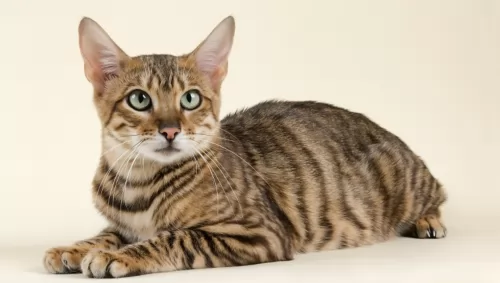 Toygers are expensive cats and there aren’t many breeders in the world. If you do decide to invest in a Toyger, he will need careful looking after, after all, you've spent a lot of money on him.
Toygers are expensive cats and there aren’t many breeders in the world. If you do decide to invest in a Toyger, he will need careful looking after, after all, you've spent a lot of money on him.
Diet is of absolute importance to keep such a cat healthy. The right environment is also important as cats and dogs for that matter too, can become ill and depressed if they find themselves in homes where they are unloved and abused.
Don't get a cat if you aren't prepared to love and care for him. Because the question is then 'why get a cat?'
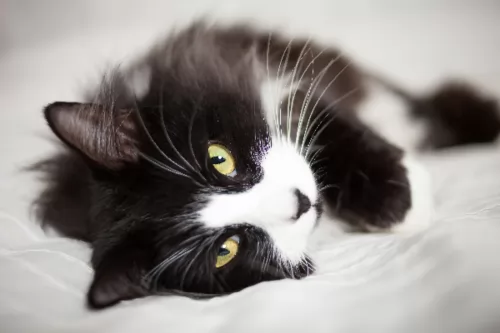 The tuxedo cat is such a sport - always up for fun and games. Cats like the tuxedo are always a great choice of pet.
The tuxedo cat is such a sport - always up for fun and games. Cats like the tuxedo are always a great choice of pet.
Cats like the tuxedo are also low maintenance and he is clever enough to even have a bit of training.
The tuxedo cat, even though he likes the outdoors, can also be an apartment cat. He also gets on well with children and other pets in the home. Having a tuxedo in the home is guaranteed to fill your home with joy, and you owe it to him to provide him with lots of love and attention.
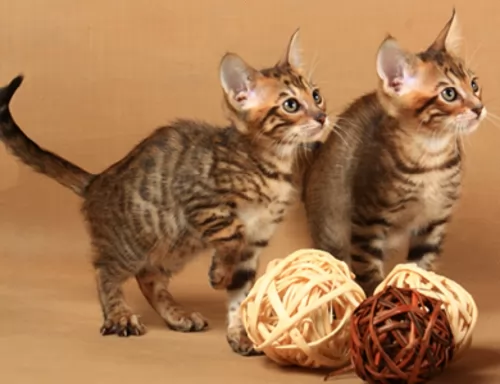 Just like in human beings, obesity can reduce the lifespan of your cat. Make sure you keep your Toyger’s weight under control.
Just like in human beings, obesity can reduce the lifespan of your cat. Make sure you keep your Toyger’s weight under control.
These cats are considered to be fairly healthy. He can be predisposed to some of the same cat conditions that the Bengal and Domestic Shorthair face.
When your Toyger shows any signs of illness, get him to the vet. Some of the common health problems your Toygers might have to contend with include obesity and heart murmurs.
A heart murmur is an abnormal heart sound, and is caused by turbulent blood flow within the heart. When you vet examines your cat, a heart murmur is detected when the vet listens to your cat's heart with a stethoscope. The vet will discuss with you the way forward for your cat.
If you get a Toyger kitten, you will have to make sure he is up to date with his vaccinations. This is part of being a responsible cat owner.
The breeder will have a record of his vaccinations and will hand this over to you.
At 6 – 8 weeks kittens start with their first injections which include vaccinations for distemper, feline rhinotracheitis, and feline calici virus.
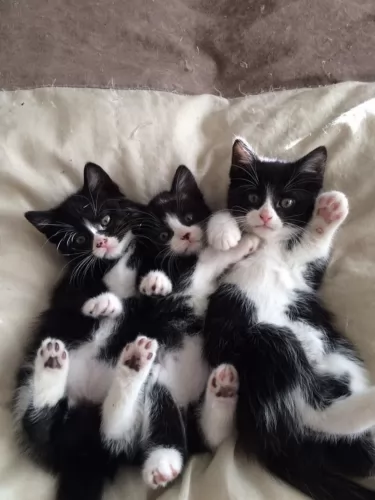 The Tuxedo cat has no real health concerns and that is just another reason why they make such popular pets. There are, however, always health issues that a cat can succumb to.
The Tuxedo cat has no real health concerns and that is just another reason why they make such popular pets. There are, however, always health issues that a cat can succumb to.
This is caused by kidney disease. It is one of the leading causes of death in older cats, and causes can include age but also genetics.
Your cat can show a number of symptoms such as excessive urination, nausea, terrible thirst, dehydration, constipation, and loss of appetite.
There is no cure for feline kidney disease but it can be treated and managed, and that is why you will need to see the vet.
This is the dreaded feline distemper for which your cat will need to be vaccinated against. It is a highly contagious viral disease, with kittens being more at risk.
After contracting the disease. It can spread through bodily fluids as well as fleas and is mostly transmitted by contaminated food and water bowls as well as litter trays.
The disease affects the intestinal tract of the cat and attacks the immune systems. Your cat will be vomiting, have diarrhea and anemia and he will have loss of appetite, lethargy and be totally and utterly down in the dumps.
Cancer is common in cats of all ages. When you brush your Tuxedo, be aware of any unusual lumps. Lymphoma is a common cancer in cats.
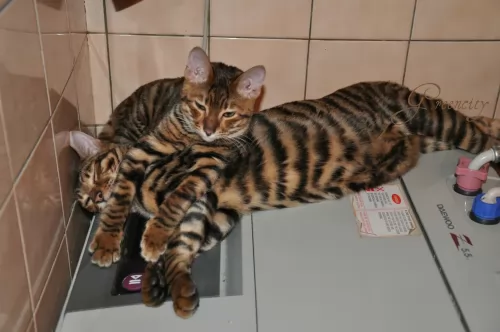 Toygers should be brushed weekly and have their nails trimmed regularly. As with all domesticated cats, you should check inside his ears to make sure they don’t become clogged with dirt and wax.
Toygers should be brushed weekly and have their nails trimmed regularly. As with all domesticated cats, you should check inside his ears to make sure they don’t become clogged with dirt and wax.
These are smart cats so they will need to be provided with attention in the form of clever games and toys that get him thinking.
Toygers need to be fed much like any other domestic cat. The most important thing to remember when feeding a cat is that they are carnivores and they require meaty food high in protein.
Speak to your vet about the absolute necessity of getting your cat’s diet right. For your convenience, cat food manufacturers have brought out many excellent cat foods that cater to the time of life your cat is in.
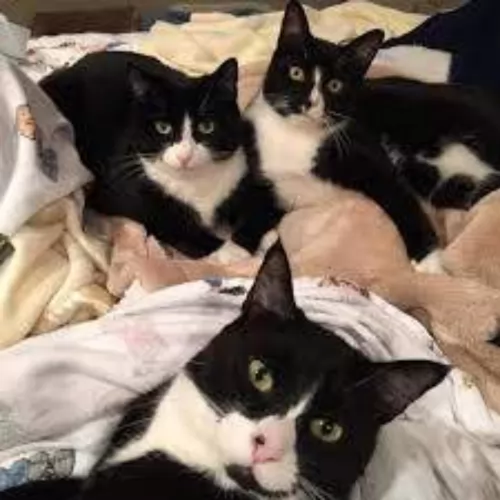 The Tuxedo cat is cared for in much the same way that you would care for any other cat really.
The Tuxedo cat is cared for in much the same way that you would care for any other cat really.
The coat of the Tuxedo requires no special treatment as the coat isn’t really ever long. Simply brush it at least once a week to reduce matting and dust collecting on the coat. You want to keep it shiny and sleek.
Provide a scratching post and a climbing tree as these are both taking care of natural instincts of a cat – to scratch and to leap.
Ensure your pet isn’t bored. Provide him with plenty of opportunities to have fun and to play. Provide him with interactive toys to keep him amused.
Cats like to sleep quite a bit so provide him with a nice soft bed in a quiet area.
If your Tuxedo is an indoor cat, he will need a litter box in a quiet area. Be sure to clean the litter box of feces every single day. Make sure that the actual litter is kept clean and tidy.
Your Tuxedo cat should be fed the same diet as any other cat. This is because every cat there is is a carnivore and their diet has to be made up of meat. A wet food diet or a dry food diet is available but make sure it is always of the highest quality. This will ensure your pet gets all the nutrients to ensure good health. Discuss your cat's s dietary needs with your vet if you are in any doubt.